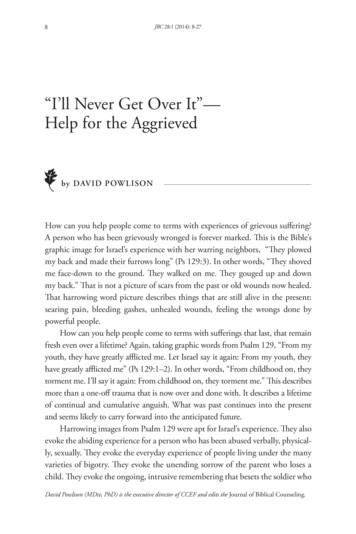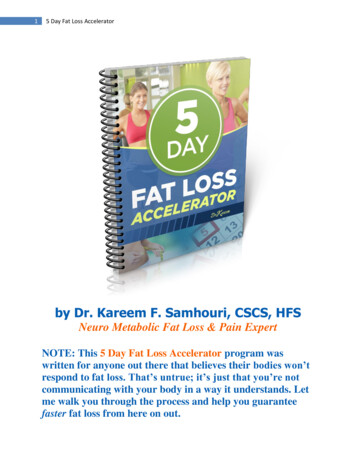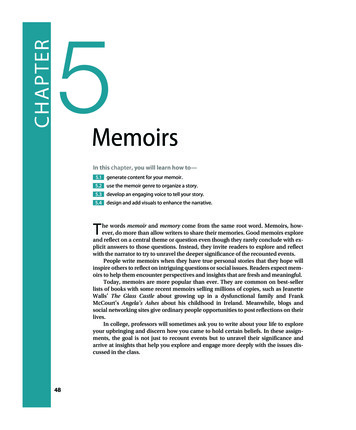
Transcription
8JBC 28:1 (2014): 8-27“I’ll Never Get Over It”—Help for the Aggrievedby DAVID POWLISONHow can you help people come to terms with experiences of grievous suffering?A person who has been grievously wronged is forever marked. This is the Bible’sgraphic image for Israel’s experience with her warring neighbors, “They plowedmy back and made their furrows long” (Ps 129:3). In other words, “They shovedme face-down to the ground. They walked on me. They gouged up and downmy back.” That is not a picture of scars from the past or old wounds now healed.That harrowing word picture describes things that are still alive in the present:searing pain, bleeding gashes, unhealed wounds, feeling the wrongs done bypowerful people.How can you help people come to terms with sufferings that last, that remainfresh even over a lifetime? Again, taking graphic words from Psalm 129, “From myyouth, they have greatly afflicted me. Let Israel say it again: From my youth, theyhave greatly afflicted me” (Ps 129:1–2). In other words, “From childhood on, theytorment me. I’ll say it again: From childhood on, they torment me.” This describesmore than a one-off trauma that is now over and done with. It describes a lifetimeof continual and cumulative anguish. What was past continues into the presentand seems likely to carry forward into the anticipated future.Harrowing images from Psalm 129 were apt for Israel’s experience. They alsoevoke the abiding experience for a person who has been abused verbally, physically, sexually. They evoke the everyday experience of people living under the manyvarieties of bigotry. They evoke the unending sorrow of the parent who loses achild. They evoke the ongoing, intrusive remembering that besets the soldier whoDavid Powlison (MDiv, PhD) is the executive director of CCEF and edits the Journal of Biblical Counseling.
“I’LL NEVER GET OVER IT” POWLISON9somehow survives horrifying carnage. They evoke Christian experience in timesand places where the beloved Son and his beloved church are steadily mocked.How can you help people come to terms with things that are long and hardand don’t go away? How can you yourself come to terms with such afflictions?My article addresses this fundamental question for life and ministry.You won’t get over it, but you do not needto be forever defined by what happened.Let me say a few words about the voice I will adopt in what follows. I willwrite directly to strugglers and would-be helpers: to you. I won’t simply writeabout the topic “Facing grievous difficulties” or “Helping others face grievous difficulties.” I hope that what and how I write will help you. I have been repeatedlystruck by how Scripture communicates God’s messages directly, concretely, andpersonally. It seems that God and those who speak for him eschew the academicmode of impersonal topical discourse! It is customary that an academic speaker orwriter adopt a posture of neutral objectivity, and there is no attempt to directly address presumed audiences and no expectation that readers or listeners might actually be talking back. The discourse remains serene, at arm’s length from the messygive and take of how life unfolds. By contrast, in Scripture, the prophets and Messiah and apostles always talk with and to the people who immediately surroundthem. And those people often talk back. The message calls for a response.I will do my best to hold you in mind and talk with you. And I want you tointeract, to react, to act. I hope to help change how you live and how you minister. I hope that we will help each other, dear reader, as we seek to help God’speople. Here’s what will follow. First, I will set the stage for thinking through howto face and process difficult experiences. Then I will put on the table two descriptions of how to do so. Finally, I will offer a series of questions to help orient andguide you as you work through your experiences.“I’ll never get over it.”Like fine china that doesn’t get brought out for everyday use, the hardest thingsin life are often kept in the cabinet. Many people carry unspeakable things inside,things that make it hard to talk, make it hard to go forward. Things like this,I’ll never get over it. What happened to me was so wrong. Itwas too wrong, too confusing, too overwhelming. It hurt toomuch—and it still does. The pointlessness, the cruelty, the be-
10“I’LL NEVER GET OVER IT” POWLISONtrayal, the loss, the complete disappointment . I don’t wantto go there. I wish I didn’t have to go there. At times I still findit hard to believe that this really happened. At times the distressand pain seem unbearable, and like it will never end. At timesanger is a holocaust inside me. At times despair feels dark andcold as death. At times flashbacks are so real that it’s all happening again right now—not just “in my head,” but viscerally,in all of me. At times—and this treadmill goes nowhere but isso hard to get off—I blame myself. I get wasted with “Whatif?” and “If only.” At all times there’s this lurking anxiety, akind of restless uneasiness inside me. And sometimes anxiety isnot subtle at all, but bludgeons me with outright fear or panic.At times something will happen, even something so minor orinnocent, and it will trigger a reaction in me that is totally outof proportion with reality. A resonance or reverb kicks in, andit rocks me deeper than I can even go. And all this turmoilseems as permanent, as destructive, and as insoluble as whathappened that was so bad.You are right. You will never get over it.Does my answer surprise you? Perhaps you find it curiously liberating to say,“I’ll never get over it. That is right. Of course. How freeing to admit thattruth about such a terrible wrong. I’m not supposed to just move on and hopeit simply washes away. So I don’t have to chase an impossibility. I don’t have toruin my life with attempts at anesthesia. I don’t have to feel like a failure becauseI’m not happy and smiley all the time.” If you aren’t expecting to find somemagic that will leave you unmarked, then you can get down to facing the pain ofwrong. You can get down to wrestling out whether there actually is a way to walkthrough fire and flood (as Isaiah 43:2 puts it).But perhaps it makes you feel hopeless to admit that some experiences willnever go away. Hear me rightly. I don’t mean that the poison and darkness of theexperience will always haunt you. You won’t get over it, but you do not need tobe forever defined by what happened. You won’t forget what happened, but thereis a way out of the raptor’s claws. I hope to walk with you part of the way out ofdespair and offer you realistic hope. It won’t erase what happened—that wouldbe to live a falsehood. But realistic hope runs deeper than any hurt. It can takethe same experience and offer a different script, a different outcome, a differentmeaning. Deep hurt so easily gets infected—by mistrust, or fear, or rage, or cal-
“I’LL NEVER GET OVER IT” POWLISON11lousness, or avoidance, or addiction, or . Hurt even gets infected by just tryingto keep yourself busy and distracted. It turns inward. It turns self-destructive.But hurt and loss can become transmuted into a deeper good—still fierce, stillsorrowing, but now clean. Not only clean, but hopeful. Not only hopeful, butfruitful. Not only fruitful, but wise. Not only wise, but even loving.You won’t forget. But you do not need to endlessly revisit what happened.You do not need to be imprisoned in the complexities and dead ends of yourinstinctive reactions. There’s a reason why that long, indented paragraph—“I’llnever get over it”— wanders all over the spectrum of human emotions. We arecomplex creatures, wired to respond to wrongs in complex ways. Emotions andreactions are not discrete data points unrelated to each other. Yes, each emotionhas its own typical coloration, but the whole palette is readily available, and thecolors easily mix it up. Here is a sample palette.t “When something seems wrong, I get angry. Anger impels me to bristle,and to go on the attack.”t “When something seems dangerous, I feel fear. Fear urges me to go onhigh alert, to take defensive measures, to withdraw, to flee.”t “When something feels too painful, I turn inward and feel how unbearable it is. The desire for relief invites me to chase any feel-good to escapethe bad feelings.”t “When it seems like there’s nothing I can do, I feel overwhelmed and indespair. I feel paralysed and passive.”t “When it seems I can’t control something, I feel anxious. I fret andflounder—and I get angry, avoidant, desperate, self-soothing, or paralyzed, or all of the above all at once!”Our reactions to grievous wrongs are muddy, not tidy. Reactions rarely appear like primary colors, sharply separated from each other. They come in hues,shades, mixtures, and combinations. Sometimes you might get a “pure” color—fora moment. But most often, you will live out some mishmash of “all of the above.”It is extremely significant that the Bible, and Jesus, and the mercies of Goddirectly engage all of the above. The lovingkindnesses of God are exactly keyedto what is grievously wrong. When life goes easy, Christian faith either seemsirrelevant or it just adds a nice frosting of spirituality and community to roundout the personal resumé. But when life goes very hard (and life always ends upvery hard), the true God sparkles. But making the connection isn’t always easy.How on earth does “You are with me” (Ps 23:4) connect with “Right now I amwalking through a dark valley. I feel vulnerable. Shadows of death threaten me. I
12“I’LL NEVER GET OVER IT” POWLISONam besieged with evils.” How does “You are with me” get traction, so that I amchanged and become unafraid?Making the connection and going forward is never an easy process. But Goddoes meet us in our need. He enters our plight in person. He shares in ourtroubles. Suffering is the crucible in which Christ shows himself. Suffering is thecrucible where faith awakens. Suffering is the crucible where love becomes wise.We learn faith and love when life goes wrong.But I am getting ahead of myself. To transmute a very deep furnace of painand unhappy reactions into something fruitful will be a hard process. And to goright back to where this article started, it is refreshing to admit, “Of course suffering will mark me. I will never just get over it. I will never just move on. Even anew sense of my life’s purpose will bear the marks of what happened.” You wouldbe false to your humanity if you simply got over it. A significant experience mustmark you for life. But pain and hatred and despair do not need to remain as running sores. Your life does not need to become a poisoned well of bitterness.Does anyone who was raped, molested, beaten, mocked, or bereaved everjust get over it? Never. You do get over the misery of a bad head cold, or flunking a pop quiz in geometry, or a teenage infatuation with a movie star. (At leastyou ought to get over these things!) But you don’t get over something important.Your sufferings count. The goal is to find a way to go through it that comes outin a good place.Perhaps you already have a taste for how this works?You may have heard of Candy Lightner. She never did get over the deathof her thirteen-year-old daughter who was run over by a drunk driver. But thisirreversible suffering was somehow transmuted into a constructive mission. Shefounded Mothers Against Drunk Driving (MADD) in 1980. The shape that hergrievous suffering took has spared innumerable parents from the same grief.Did Martin Luther King ever get over a lifetime of facing racial prejudice?Such experiences are a crucible within which many people become sour, suspicious, and embittered. For MLK, it led to “I have a dream” of what race relationscan become. The wrongs he suffered gave shape to a life purpose worth living forand worth dying for. His life was unmistakably marked by the ugliness of racism. He never forgot. In fact he made it his life work to continually face what hefound grievous. He was not disfigured by the encounter, but dignified.Could Aleksandr Solzhenitsyn have gotten over his tortures in Joseph Stalin’s gulags? No. Should he have tried to move on with a “normal” life? No. Hisdegradation in the camps became the seedbed of his life work. Read Solzhenit-
“I’LL NEVER GET OVER IT” POWLISON13syn’s Gulag Archipelago. You will witness a rare example of a man who did notbecome self-righteous and self-pitying as he catalogued evils. The power ofwhat he wrote arose from something that happened inside him: a moral reckoning, a hard look in the mirror. He rebukes any readers who expect his bookto be a self-righteous political exposé comparing all those bad people to all usinnocent people:If only it were all so simple! If only there were evil peoplesomewhere insidiously committing evil deeds, and it werenecessary only to separate them from the rest of us and destroy them. But the line dividing good and evil cuts throughthe heart of every human being .Confronted by the pit into which we are about to tossthose who have done us harm, we halt, stricken dumb: it isafter all only because of the way things worked out that theywere the executioners and we weren’t.From good to evil is one quaver, says the proverb.And correspondingly, from evil to good.1As Solzhenitsyn takes a hard look at his own soul in the mirror, he made theturn from evil to good. He comes out in the image of God, with his sense ofjustice and his sense of mercy equally strong. A person who faces grievous evilmust do a hard reckoning to come out wise and not corrupt. Solzhenitsyn facedcruelty and wrong, and his own actions and responses seemed justifiable. Andyet he identified within himself the same capacity for wrong. He found thatit is the easiest thing in the world to return evil for evil. At such times, it is thehardest thing in the world to find one’s way to what is good, to find one’s ownneed for the mercies of God.Each of these people is only a pointer. Each provides us with a flawed example. Their various good insights and resolutions mix with remaining contradictions. They are mixed cases. They are people like you. They are people like me.But each case shows something good emerging from the encounter with great evil.Each example demonstrates how God’s grace works good in a world of evils. Eachof these people points wittingly or unwittingly to how Christ faces, engages, andwalks through grievous evils. He did it first and best. He did it for us. He promises to do it with us and in us. He does what he promises. He helps the aggrieved.1Aleksandr I. Solzhenitsyn, The Gulag Archipelago, 1918–1956, translated by Thomas Whitney andHarry Willetts, abridged by Edward Ericson (New York: Harper & Row, 1985), 75.
14“I’LL NEVER GET OVER IT” POWLISONTwo StoriesIn this section, I will work through two stories. These are deep matters, and wewill take the time to notice so we might take to heart. And then, in the next section, I will ask you to make it personal by thinking through your own life experience.An Aggrieved FatherThe first story is Alan Paton’s Cry, the Beloved Country. It is one of the greatnovels of the twentieth century.2 Read it (or reread it) as a fine story. Along theway, notice that it is a case study in great wrongs and great suffering. It is a casestudy in anger and fear, hurt and loss, guilt and grace—real life can’t be carvedinto discrete pieces. The teacher in me would gladly assign Paton’s book as a companion to this article. His story does a better job than any analysis in giving youa feel for how struggles with hard things work out either for good or for evil. It’sshow (not tell) for how the struggle with overwhelming evils can be transmutedinto good.The story is set in South Africa during the 1940s (just before apartheid became policy). Stephen Kumalo is a black South African, and an Anglican pastorin a small, impoverished village. His son had left home for Johannesburg, and hedrifted into a life of petty crime. Kumalo goes to the city, seeking to rescue hisson. But he finds him too late. The son has just been arrested for a murder committed in panic when the homeowner walked in on a burglary.The various dark responses to suffering appear in many different ways, inmany different characters, for many different reasons. We might be tempted tothink of “pain” as a reaction to an uncomfortable stimulus. We might be temptedto think of “anger” as a flare up arising from a specific provocation. We might betempted to think of “fear” as apprehension in the face of a particular threat. Butin Cry, the Beloved Country the stimuli, provocations, and threats spread as wideand deep as life itself. The very conditions of existence are systematically humiliating. Kumalo and others in the story live within unfairness, injustice, extremepoverty, systematic racism, powerlessness, the wrecked lives of loved ones whohad bad options and made bad choices. When evil is all-encompassing, no oneparticular incident is decisive for causing pain, provoking you to anger, arousingfear. Any one of a thousand daily incidents simply delivers one more slap to theface of a man who has been repeatedly beaten. How could anyone ever get overthis? How can hurt, outrage, anxiety, and despair not become all-consuming?2Alan Paton, Cry, the Beloved Country (New York: Scribner, 1948; 1987 edition).
“I’LL NEVER GET OVER IT” POWLISON15How can sin not be the automatic response to temptation?3Kumalo struggles with his own sins. He sometimes loses it. But he does notget lost in it. Several things prove significant as he comes through evils without becoming immolated and enslaved by his sins and sorrows. I will mention three factors.First, he is befriended by a man named Msimangu, a fellow Anglican pastor. Msimangu acts with great kindness, generosity, and tact. But when Kumaloresponded, “You are kind,” his friend answered, “I am not kind. I am a selfishand sinful man, but God put his hands on me, that is all” (p. 55). His is an unusual kindness. It is born of hard reckoning with his all-consuming instinct forselfishness. It is born of being grasped by the love of God in person. Msimangu’skindness was able to be wonderfully blunt with Kumalo as appropriate. It wentfar deeper than being a “nice person.” He was an honest man who reckoned withhis sinfulness, weakness, and selfishness—and God’s mercy made him different.Msimangu’s hard-won goodness gives him the authority to voice a greatmoral challenge to any human being who has faced grave suffering. Black SouthAfrican? Survivor of domestic violence? Shi’a Muslim in a Sunni city—or viseversa? Bereaved parent? You? Msimangu puts it this way, “I have one great fearin my heart, that one day when they are turned to loving, they will find that weare turned to hating” (p. 71). He did not mean that he was waiting for those inpower to change or expected those who did wrong to suddenly do right. Buthe was performing a hard and necessary moral calculus for the sake of victimseverywhere. He was reckoning up one difficult fact: reactive hate is just as muchhate as the act of hate that provoked it. He was reckoning with how self-pity andself-justification are narcotics that destroy moral reasoning. We point the fingerat those who do gross wrong and in so doing justify our own wrongs—lesser indegree perhaps, lesser in impact, but significant perversions of the image of Godand of true humanness. The same dynamics that operate in petty bickering operate when vile evils are present. Because Msimangu knew the inworking power ofGod’s mercy, he could be frank with Kumalo’s anger and fear. Will you who arewronged, go wrong? Will you find yourself turned to hating, or will you find thestrong mercy that turns you to loving?Second, while in Johannesburg, Kumalo rented a room in the house of anelderly widow, Mrs. Lithebe. She was poor, and knew her own troubles. But ona number of occasions, when his troubles were too great to bear, too great to3People usually conceive of temptation as allure—the draw of some illicit or destructive pleasure.But most temptations are painful, not alluring. Amid physical pain, we are easily tempted to irritability.When treated wrongly, we are easily tempted to react in kind. When bereaved, we are easily tempted togrieve as those who have no hope.
16“I’LL NEVER GET OVER IT” POWLISONsolve, she showed him some simple generosity. When he thanked her, she replied,“Why else do we live? For what else are we born?” (pp. 151, 227). If you havefaced a great suffering—racism, disability, rape, betrayal, bereavement—there isno immediate solution by which you or any other human being can make it allbetter. But small, practical kindnesses count. Kumalo received such from Mrs.Lithebe, and he gave the same to others. In the end, he did not become embittered. He became simple in showing small kindnesses. The more insoluble andheartbreaking a problem, the smaller the action that is called for in any particularmoment. We are slow to grasp this. Great suffering produces great anger, greatfear and great despair, in part because no great solution is possible. But the smallremediations matter a great deal. Mrs. Lithebe grasped something that victimsneed to receive and must learn to give. Small goods amid great evils are part ofbecoming free from the waste of our wraths and sorrows.Third, Kumalo returns home to his village when there are no more avenuesof appeal for his son. On the night before his son is to be hanged for murder,Kumalo says to his wife, “I am going up into the mountain” (p. 305). He getsaway, taking time to reckon honestly with himself and God. At first, the memoryof all that had happened and all that was about to happen overwhelmed him. Butthen he consciously “turned aside from such fruitless remembering” (p. 308).“Fruitless remembering.” That is a good way to describe one place it is easy toget stuck when you’ve been done deep wrong. Kumalo had learned that there is adifferent road that can (and must) be taken.He uses an interesting phrase for the alternative: “He set himself to the order of his vigil” (p. 308). Kumalo takes himself in hand. He does not wallow inregret, self-torture, recrimination, accusation. He consciously heads in a differentdirection according to a different purpose. The order of his vigil on the mountainunfolds in this manner. He sifts his conscience, and confesses his specific sins ofanger and lying. Then he probes his memory for all the people who had showedhim kindness, and gives specific thanks for them. Finally he cries out for mercy,mercy for his son, for himself, for his people, for his country. The last chapter ofCry, the Beloved Country ends with this cry. In the midst of irremediable suffering, when tempted to fruitless remembering, in the midst of his powerlessness tomake better all that is so wrong, a man asks God for mercies. On his mountain,Kumalo seizes hold of the one hope deeper than the deepest wreckage of hopes.He brings his cares to the One who cares for him. He lives out the rhythmsof Christian faith: self-knowing before God, frank confession, honest gratitude,pointed intercession going forth to live in the way of obedience.
“I’LL NEVER GET OVER IT” POWLISON17This is a life and death matter. When something is so wrong that you willnever get over it, your reaction will either make you wise or will poison you. Greatsuffering puts a fork in the road. You will choose. You will of necessity choose. Itis no accident that kyrie eleison—“Lord, have mercy”—is the essential prayer ofthe man or woman who faces facts honestly. It is no accident that “Blessed arethe poor in spirit” is the first and foundational beatitude (Matt 5:3). A deep innersense of need for help from outside yourself is the essential step of sanity. It is thisfaith—“I am poor and needy. Help me.”—that Jesus commends so often. FaithWhen something is so wrong that you willnever get over it, your reaction will either makeyou wise or will poison you. Great sufferingputs a fork in the road. You will choose.is not a leap into darkness and unreason, despite the cold hard facts. Faith is thehonest reckoning with your need for help, and then the reasonable step in thedirection of the person who can help you, given all the facts. Because Kumalo’sfaith is reasonable and honest, he reaches for promised mercies and help.Perhaps these last pages seem odd to you. Our culture usually portrays suffering or anger or despair or anxiety as things with “How to” solutions. But thethings that cause the deepest angers, fears, and despairs are betrayals at a depththat calls for a different way of thinking about solutions. You must learn to livehonestly in the face of evils that don’t necessarily go away. You must learn tohonestly face down your own evil in the light of bigger mercies: “I am a selfishand sinful man, but God put his hands on me, that is all.” When someone elsedid you wrong by acts of hate, will you find that you are turned to hating? Whensome tragic accident bereaved you, will you find you are turned to fearing? Whenyour own dying approaches, will you find you are turned to denial or to despairing?When hopes are crushed and dismembered, you must learn the one hopethat can never be destroyed: “In this is love, not that we loved God, but thathe loved us, and sent his Son to be the propitiation for our sins” (1 John 4:10).Those words are not intended for “religious” people in “religious” contexts. Theyare words for the actual troubles we all must face, for the actual failings we allhave, for all the things that prompt the Son’s self-sacrificing love.When this holds you, as this takes root inside you, you learn how to live well
18“I’LL NEVER GET OVER IT” POWLISONup against all that is wrong: “Beloved, if God loved us in this way, we also oughtto love one another” (1 John 4:11). You can be thankful. You can consider others.You can do small things gladly. Why else do we live? For what else are we born?You learn that you can make some difference. You can be merely helpful—notsalvific. You will never think that you are better than any other human being. Youwill never think your efforts can right all wrongs. Beloved, you learn not to hateor fear or despair. You learn not to numb yourself. You learn to care.I hope that these last few pages are freeing for you. Modern American society does not often tell us these things. What we mostly hear are the voices ofself-assertion, self-confidence, self-esteem, self-protection, self-justification, andself-management. We live in a culture of can-do. Just believe in yourself. Followyour dream. Fix the problem. Say whatever you happen to feel or think. We don’toften hear the voices of honest suffering from people who are learning to be wiseand caring.Make no mistake, there are things to be done. I appreciate pragmatism ofthe right sort—and Kumalo, Msimangu, and Mrs. Lithebe are utterly practicalpeople. They roll up their sleeves and do something. At the end of this article, Iwill ask you to get practical. I will offer a road map, a series of questions for helping you understand and address unruly emotions and reactions. We will roll upour sleeves to get street-level practical.There is something deeply refreshing in being able to say that what is brokencan’t be fixed up good as new. The pain from what hurts so badly can’t be taken allaway. But you can do the good, hard, true reckoning with what happened, withyourself, and with our God. You can learn reasons to live that are better by far.MartinaThe second story is about a woman I had the privilege of getting to knowmany years ago. Martina had suffered more terrible things than anyone I’ve everknown. She was married and in her mid-30s when she and her husband soughtcounsel for conflicts they were having about how to raise their children. We addressed those, but as her larger story also emerged, she made a profound impression on me. She had been sexually abused from childhood until she was rescuedby the Department of Youth & Family Services (DYFS) in her teens. She hadbeen used as a sexual receptacle by her father and older brothers. Her entire life,from age 4 to 15, was an Auschwitz of sexualized violence. It was all she everknew.DYFS placed Martina with a foster family who loved her. They were safe.They provided for her. They protected her. They set clear guidelines for what was
“I’LL NEVER GET OVER IT” POWLISON19right and wrong regarding how to treat others with respect. They modeled andtaught her about the words you use, the way you deal with problems, the wayssexuality is meant to be expressed, respect for personal property. There was noinstant presto, everything’s fine. When Martina came to live with her new family,she was prone to violent rages, spoke abusively, was crudely sexual, stole whatevershe could get her hands on, trusted no one, obeyed no one, lied freely, was lazy,existed in a maelstrom of impulsive cravings and terrifying fears. In other words,she incarnated all that is not love, all that is destructive and self-destructive, allthat needs effective mercy and help.Jesus’ story shows how incalculable wrong istransmuted into unfathomable good.Out of the maelstrom of these sufferings and her own chaos, and in the context of her foster parents’ love, Martina came to know Jesus when she was nineteen years old. Jesus is not just a pointer, like a Solzhenitsyn or a Mrs. Lithebe. Heis the one to whom the pointers point. Jesus’ story shows how incalculable wrongis transmuted into unfathomable good. He was not above it all. He entered ourgrievous plight. A man of sorrows, intimately acquainted with grief, enters intothe hard places and comes under the afflictions. Jesus himself has never gottenover his experience of evil. He never got over it. It gives shape to his love, hiscourage, and his purposefulness. Jesus’ friends recognized him when he invitedthem to “See my hands and my feet” (Luke 24:39–41). They saw the marks o
experience will always haunt you. You won’t get over it, but you do not need to be forever de!ned by what happened. You won’t forget what happened, but there is a way out of the raptor’s claws. I hope to walk with you part of the way out of despair and o#er you realistic hope. It won’t










